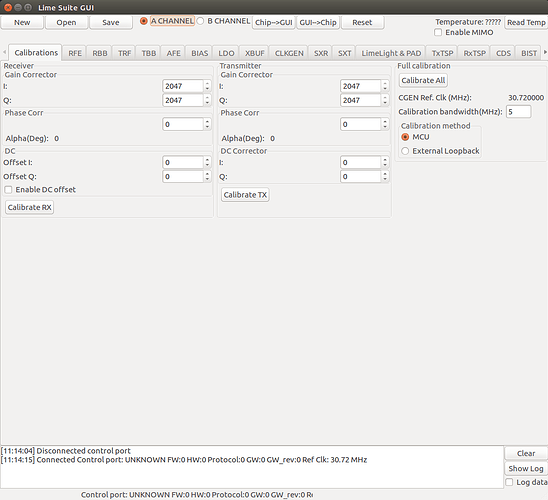I have 2 of the Lime SDRs, and cannot get them working with anything, So I am down to just verifying that i have a usable software install.
I thought I had a firmware mismatch, and ran “LimeUtil --update” and I think I bricked one of my Lime SDRs. (Green FPGA LEDs, no power LED and FX3 LED blinks RED) But more on that after I actually get something working on the remaining one, obviously don’t want to try the update again just yet.
Hardware is an Intel NUC i5:
user@nuc-lab:~/Downloads$ sudo lshw -short
[sudo] password for user:
H/W path Device Class Description
system Desktop Computer
/0 bus D54250WYK
/0/0 memory 64KiB BIOS
/0/3a processor Intel(R) Core™ i5-4250U CPU @ 1.30GHz
/0/3a/3b memory 512KiB L2 cache
/0/3a/3c memory 128KiB L1 cache
/0/3a/3d memory 3MiB L3 cache
/0/3e memory 16GiB System Memory
/0/3e/0 memory 8GiB SODIMM DDR3 Synchronous 1600 MHz (0.6 ns)
/0/3e/1 memory 8GiB SODIMM DDR3 Synchronous 1600 MHz (0.6 ns)
/0/100 bridge Haswell-ULT DRAM Controller
/0/100/2 display Haswell-ULT Integrated Graphics Controller
/0/100/3 multimedia Haswell-ULT HD Audio Controller
/0/100/14 bus 8 Series USB xHCI HC
/0/100/14/0 usb2 bus xHCI Host Controller
/0/100/14/0/2 generic WestBridge
/0/100/14/0/4 input USB Receiver
/0/100/14/1 usb3 bus xHCI Host Controller
/0/100/16 communication 8 Series HECI #0
/0/100/19 eno1 network Ethernet Connection I218-V
/0/100/1b multimedia 8 Series HD Audio Controller
/0/100/1d bus 8 Series USB EHCI #1
/0/100/1d/1 usb1 bus EHCI Host Controller
/0/100/1d/1/1 bus USB hub
/0/100/1f bridge 8 Series LPC Controller
/0/100/1f.2 storage 8 Series SATA Controller 1 [AHCI mode]
/0/100/1f.3 bus 8 Series SMBus Controller
/0/1 scsi0 storage
/0/1/0.0.0 /dev/sda disk 500GB Samsung SSD 850
/0/1/0.0.0/1 volume 511MiB Windows FAT volume
/0/1/0.0.0/2 /dev/sda2 volume 449GiB EXT4 volume
/0/1/0.0.0/3 /dev/sda3 volume 15GiB Linux swap volume
/1 power To Be Filled By O.E.M.
And I’m running Ubuntu 16.04, fully up to date:
user@nuc-lab:~/Downloads$ uname -a
Linux nuc-lab 4.8.0-46-generic #49~16.04.1-Ubuntu SMP Fri Mar 31 14:51:03 UTC 2017 x86_64 x86_64 x86_64 GNU/Linux
I installed the following from the repositories (Seemed like the easiest way to get started)
sudo add-apt-repository -y ppa:ettusresearch/uhd
sudo add-apt-repository -y ppa:myriadrf/drivers
sudo add-apt-repository -y ppa:myriadrf/gnuradio
sudo add-apt-repository -y ppa:gqrx/gqrx-sdr
sudo apt-get update
sudo apt-get install osmo-sdr libosmocore libosmocore-dev gnuradio
sudo apt-get install limesuite limesuite-udev limesuite-images
sudo apt-get install soapysdr soapysdr-module-lms7
sudo apt-get update
When i plug in the Lime SDR:
relevant dmesg output when I plug in the Lime
[ 1892.407782] usb 2-1: new high-speed USB device number 3 using xhci_hcd
[ 1892.548392] usb 2-1: New USB device found, idVendor=04b4, idProduct=00f3
[ 1892.548396] usb 2-1: New USB device strings: Mfr=1, Product=2, SerialNumber=3
[ 1892.548399] usb 2-1: Product: WestBridge
[ 1892.548401] usb 2-1: Manufacturer: Cypress
[ 1892.548403] usb 2-1: SerialNumber: 0000000004BE
user@nuc-lab:~$ lsusb
Bus 001 Device 002: ID 8087:8000 Intel Corp.
Bus 001 Device 001: ID 1d6b:0002 Linux Foundation 2.0 root hub
Bus 003 Device 001: ID 1d6b:0003 Linux Foundation 3.0 root hub
Bus 002 Device 002: ID 046d:c534 Logitech, Inc. Unifying Receiver
Bus 002 Device 003: ID 04b4:00f3 Cypress Semiconductor Corp.
Bus 002 Device 001: ID 1d6b:0002 Linux Foundation 2.0 root hub
user@nuc-lab:~$ LimeUtil --info
######################################################
LimeSuite information summary
######################################################
Version information:
Library version: v17.02.1-myriadrf1~xenial
Build timestamp: 2017-03-12
Interface version: v2017.2.0
Binary interface: 17.02-1
System resources:
Installation root: /usr
User home directory: /home/user
App data directory: /home/user/.local/share/LimeSuite
Config directory: /home/user/.limesuite
Image search paths:
- /home/user/.local/share/LimeSuite/images
- /usr/share/LimeSuite/images
Supported connections:
- NovenaRF7
- PCIEXillybus
- STREAM
- uLimeSDR
user@nuc-lab:~$ LimeUtil --find
- [WestBridge , media=USB 2.0, module=STREAM, addr=04b4:00f3, serial=0000000004BE]
user@nuc-lab:~$ SoapySDRUtil --info
######################################################
Soapy SDR – the SDR abstraction library
######################################################
Lib Version: v0.5.4-0.5.4-myriadrf1~xenial
API Version: v0.5.2
ABI Version: v0.5-2
Install root: /usr
Module found: /usr/lib/x86_64-linux-gnu/SoapySDR/modules0.5-2/libLMS7Support.so
Loading modules… done
Available factories…lime, null,
user@nuc-lab:~$ SoapySDRUtil --find
######################################################
Soapy SDR – the SDR abstraction library
######################################################
Found device 0
addr = 04b4:00f3
driver = lime
label = WestBridge [USB 2.0] 4BE
media = USB 2.0
module = STREAM
name = WestBridge
serial = 0000000004BE
So it looks like everything is good, but no osmosdr blocks in GRC and when I connect to the Lime with the LimeUtilGui It shows all the version information as 0 and cannot / will not pull the device info. See attached screen shots.
Maybe I’m just missing something obvious, or have done something out of order or wrong. (Hard to tell, as I cannot find even a simple quick start tutorial that is complete / up to date)
I have been through the forum, that’s what led me to try the firmware update (didn’t go well, red blinky) And I have a couple years experience with other SDR platforms, GNURadio, GQRX etc…
No idea where to go from here. Any ideas / suggestions / experiences / comments or information would be greatly appreciated.
BT/AR
Chris “Gump” Graves





